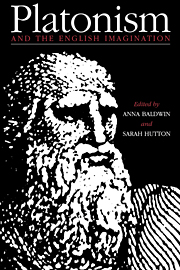Book contents
- Frontmatter
- Contents
- Notes on contributors
- Preface
- I ANTIQUITY
- II THE EARLY CHRISTIAN PERIOD AND THE MIDDLE AGES
- III THE RENAISSANCE AND THE SEVENTEENTH CENTURY
- IV THE EIGHTEENTH CENTURY
- V THE NINETEENTH CENTURY
- VI THE TWENTIETH CENTURY
- 24 Introduction
- 25 Yeats and Platonism
- 26 Virginia Woolf and Plato: the Platonic background of Jacob's Room
- 27 Plato and Eliot's earlier verse
- 28 The Cantos of Ezra Pound: ‘to build light’
- 29 Platonism in Auden
- 30 Platonism in Iris Murdoch
- Bibliography
- Index
29 - Platonism in Auden
Published online by Cambridge University Press: 15 December 2009
- Frontmatter
- Contents
- Notes on contributors
- Preface
- I ANTIQUITY
- II THE EARLY CHRISTIAN PERIOD AND THE MIDDLE AGES
- III THE RENAISSANCE AND THE SEVENTEENTH CENTURY
- IV THE EIGHTEENTH CENTURY
- V THE NINETEENTH CENTURY
- VI THE TWENTIETH CENTURY
- 24 Introduction
- 25 Yeats and Platonism
- 26 Virginia Woolf and Plato: the Platonic background of Jacob's Room
- 27 Plato and Eliot's earlier verse
- 28 The Cantos of Ezra Pound: ‘to build light’
- 29 Platonism in Auden
- 30 Platonism in Iris Murdoch
- Bibliography
- Index
Summary
‘I would rather,’ wrote Auden, ‘if I must be a heretic, be condemned as a pantheist than as a Neoplatonist’.This is typical of Auden's attitude to Plato: writing about him casually in poems and at some length in essays, he is usually critical. One such essay is his preface to The Portable Greek Reader, which contains his own selections from Plato. His main criticisms are that Plato's Republic was a tyranny and his philosophy dualist. But one argues earnestly only against ideas that one takes very seriously. In fact, Auden seems to define himself against Plato, Christian sacramentalist against classical transcendentalist.
But there are other ways of reading Plato, which connect rather than oppose Christian and classical. Iris Murdoch reads his work as a religious vision based on love of good, on the energy of Eros and on purifying Eros from the blurring projections of ego by constantly attending to reality. Auden is secretly much closer to this version of Plato than to his own, enough for G.T. Wright to write that, ‘his way of thinking is at times remarkably Platonic’.When one compares him to Beckett, another great modern writer who is deeply read in theology, one can see how true this is. Auden uses a Platonic vocabulary totally alien to Beckett: the Good, beauty, justice and the Just City, desire for truth, intelligence, love (which Auden often calls Eros); even anamnesis, polis and the Socratic sign.
- Type
- Chapter
- Information
- Platonism and the English Imagination , pp. 319 - 329Publisher: Cambridge University PressPrint publication year: 1994

